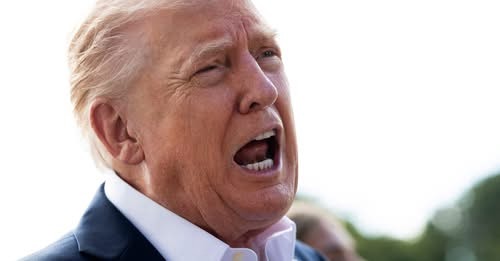
WASHINGTON – If former FBI Director James Comey wins a quick dismissal of the charges against him, it may be thanks to something apparently beyond President Donald Trump’s control: his own mouth.
“He’s a dirty cop. He’s always been a dirty cop,” Trump told reporters Friday morning as he left the White House to go watch a golf tournament in Long Island. “Everybody knew it.”
Those remarks came soon after he posted comments on his social media site disparaging Comey and gloating about the federal false statement and obstruction of justice charges against him that he himself had publicly insisted upon.
“No one from the White House should be saying anything about Comey or the indictment,” said Ty Cobb, a lawyer in the White House Counsel’s office during Trump’s first term and once a federal prosecutor. “But there are no guardrails there in this administration, no adults.”
Prosecutors, who represent the state, are supposed to refrain from commenting publicly about criminal cases and present their accusations and evidence in court. In this case, Trump’s numerous previous attacks on Comey, his many campaign vows to seek retribution against those who investigated or prosecuted him and his social media post demanding that Attorney General Pam Bondi charge Comey and others already laid the foundation that Comey was charged only because of pressure from Trump.
His statements after the indictment was announced Thursday evening only cement that impression, Cobb and other former prosecutors said, and could serve as the basis for a successful request to dismiss the case as “vindictive” prosecution.
Glenn Kirschner, who worked 24 years as a federal prosecutor in Washington, D.C., said motions for selective and vindictive prosecutions are usually difficult to win because it is normally difficult or impossible to produce evidence. That will not be the case for Comey, he said.
“Here, Donald Trump has been on the warpath, wanting his enemies prosecuted, evidence be damned,” Kirschner said, adding that unlike in previous administrations where there was a separation between the White House and the attorney general, that no longer exists under Trump.
“Let’s face it, he is the lead prosecutor in every case, given that he has wrestled prosecutorial discretion away from the Department of Justice,” Kirschner said.
Also in Comey’s favor are the circumstances leading to Thursday’s indictment. Trump forced out the interim U.S. attorney for the district, Erik Siebert, after he reportedly declined to take the Comey case to a grand jury. Trump replaced him with a supporter, Lindsey Halligan, who has never been confirmed by the U.S. Senate, which may have run afoul of federal appointment rules and could invalidate the indictment, Kirschner said.
In January, Trump made Siebert the interim U.S. attorney for the Eastern District of Virginia office. When the 120-day limit expired, Siebert was appointed by the federal judges in that district to remain in the position until the Senate could confirm him for the job permanently. Instead, Trump fired him and replaced him with Halligan, a former insurance lawyer with no criminal law experience. It is unclear, though, whether the law allows for a second, 120-day interim U.S. attorney.
“She literally might not have the right to set foot in that grand jury room,” Kirschner said.
Whether Comey will ask the trial judge to dismiss the case for either of those reasons remains to be seen. In a video statement posted Thursday evening, Comey said he was not afraid of Trump or the charges against him. “I’m innocent. So let’s have a trial and keep the faith,” he said.